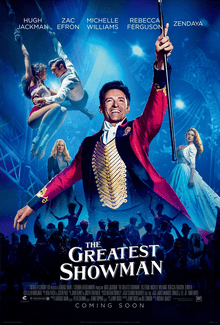 If at every moment during The Greatest Showman, one forgets the actual P.T. Barnum, then the movie with his name in it is splendid. Since most people know nothing about Barnum other than that his name used to be on a circus, this is not difficult for a typical audience. Most of my students have never even been to a circus!
If at every moment during The Greatest Showman, one forgets the actual P.T. Barnum, then the movie with his name in it is splendid. Since most people know nothing about Barnum other than that his name used to be on a circus, this is not difficult for a typical audience. Most of my students have never even been to a circus!
I knew too much about Barnum and so I struggled. Still, this is an entertaining motion picture, almost an excellent show. The movie kept telling us we were watching the “greatest show,” keeping away from the still protected by law phrase “Greatest Show on Earth.”
That’s about right. This is the greatest show while you are watching, maybe even compared to anything else now playing at a local American multiplex. But at no point is it the greatest show on earth.
The Greatest Showman: The Good, the Bad, and the Ugly
It is a delightful humbug that made me laugh and cry. The music was not quite Hamilton but it beats High School Musical. If you love musical theater, your movie choices are few. The Greatest Showman is a decent musical movie if you think of it as being related to Barnum in the same way South Pacific is related to World War II.
I liked it, I really did, and the show had several ideas in it that nobody (certainly no Christian) can dislike.
- First, we should stick to our friends and family and not dump them for richer, snobbier folks.
- Second, everyone is human and deserves a chance to shine.
- Finally, follow the guy with the imaginative plan–not the drones. Plato knew it and this movie spangles the truth that mental liveliness can see what drones never dream exist.
This is excellent. If you toss in a solid sneer at racism, then we are on solid ground.
Still, the movie has a haunting theme that is better than the handling of these many (relatively) uncontroversial concepts. When Barnum’s (never aging) young daughter wishes ballet lessons, he gives them to her as soon as he can afford them. She tries out, watching snobs sneer, and she is heartbroken. Barnum pitches her on how great she is–a bit of parental humbug we all try–and she rightly notes that she has started late. She turns to her dreamy-eyed dad and tells a hard truth: ballet is difficult and requires real work and talent. It is not a sideshow where simply being odd is enough. It is not a dream that clever talk can make come true.
She is right.
The filmmakers do not develop this theme. Barnum decides to get his daughter accepted into high society by promoting the Swedish Nightengale, Jenny Lind. This the most historically rotten part of the movie.
Jenny Lind: More Than a Diva
The way the filmmakers treated this real-life person–a highly moral super-talent in real life–almost ruined the movie for me. I can accept that her character is not the opera diva Miss Lind was in real life. The movie Jenny Lind is a throaty pop singer not even as good as some of the “lesser” pop talents in the circus. I suppose I must accept that we were not going to hear real opera in a modern Hollywood film.
OK.
But does she have to be a temptress and a second-rate talent?
If you have ever known an opera diva, as I do, then you know they can sing pop music fabulously, but also music so hard that an untrained voice would have no more chance at hitting the notes than a naturally fast runner would have of making the modern Olympics.
Jenny Lind (the real one) sang so well she maddened and inspired Mendelssohn. She may not have been the greatest opera singer in the world, opera is too varied to have one greatest, but she was a serious talent. She worked hard at it and gave away spectacular amounts of money to churches and the poor. Historically, Barnum and Lind made serious coin from their joint project. Lind eventually decided to go it alone, but she did not bankrupt Barnum, she helped take him to the next level of fame, and they certainly were not an item.
Lind shows that some things cannot be humbugged. Some things are so piercingly perfect that they cannot be stitched together like a Fiji mermaid. They are the solid products of talent, time, and training, like her voice.
The Greatest Showman: Good Fun, But Not the Film it Might Have Been
The movie is (of course) also made by people who work hard on their craft. Start a film program and you will see what is required to make even a simple student film. Trust me, every second of a movie like this one requires many super-talented people. Yet the film retreats from the subtler point that easy entertainment is dangerous. After all, isn’t there a dangerously thin line between the people who come to gape at the Dog Faced Boy and the one who attacks him? Both are not reflective, both rely on the untrained sensibility. Isn’t there really harder, higher art that requires hard work and training? Doesn’t this very movie show this to be true?
And there is Jenny Lind, herself, the complicated, sensual, pious, Swedish Nightengale. Isn’t this a good time for a film about a woman who conquered class prejudice through talent and hard work?
Yes. Perhaps.
I like The Greatest Showman, but it was almost a joyful and profound movie. You stick to your friends: that’s the theme they went with, but it is also true that hard and great tasks generally require more than packaging and flare. A man can be friends with Jenny Lind and Tom Thumb. For all his faults, the real P.T. Barnum actually was.
Rachel Motte edited this essay and added the sub-headings.















